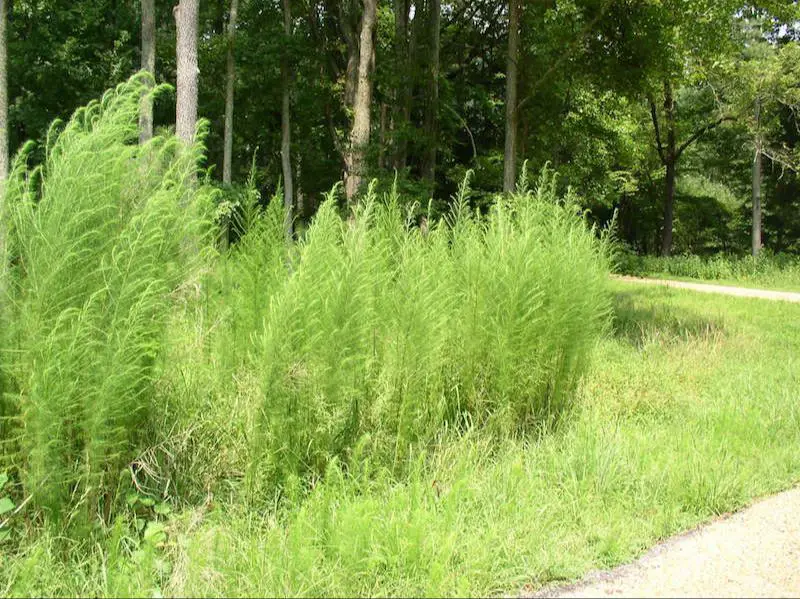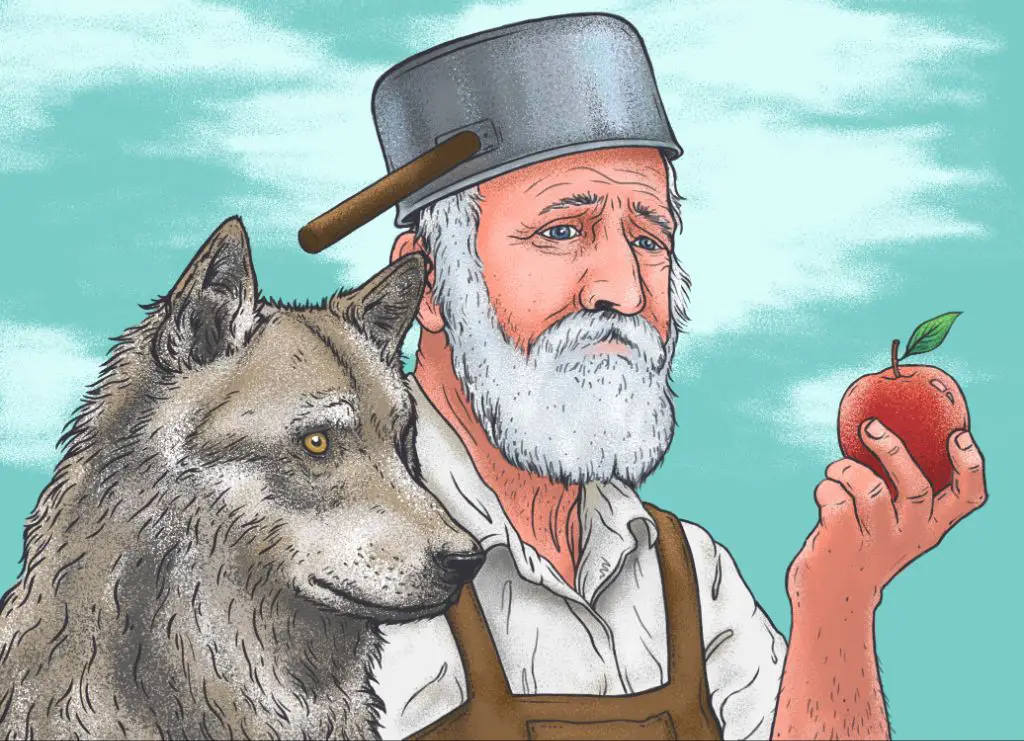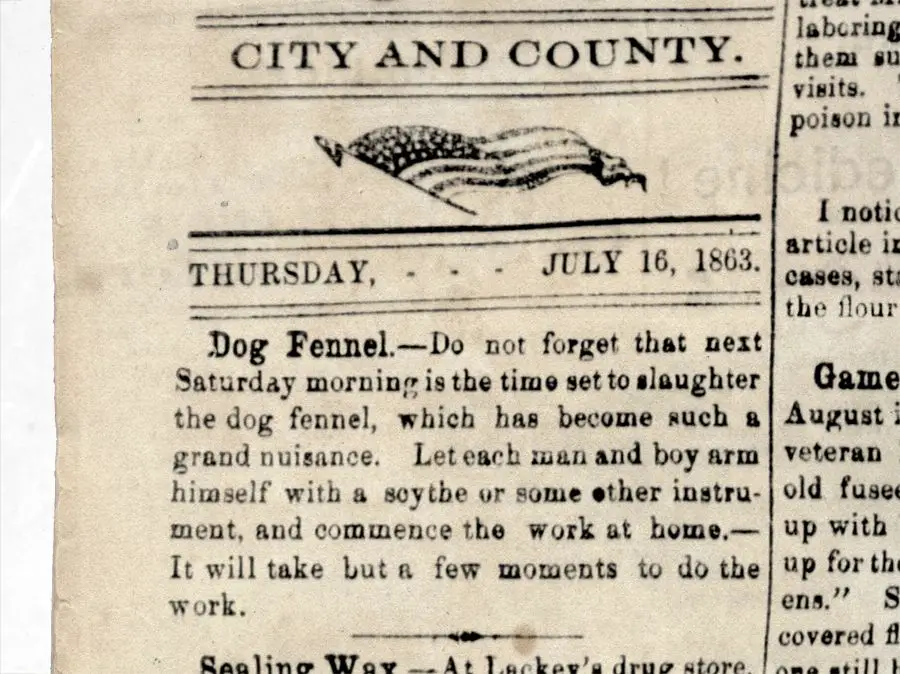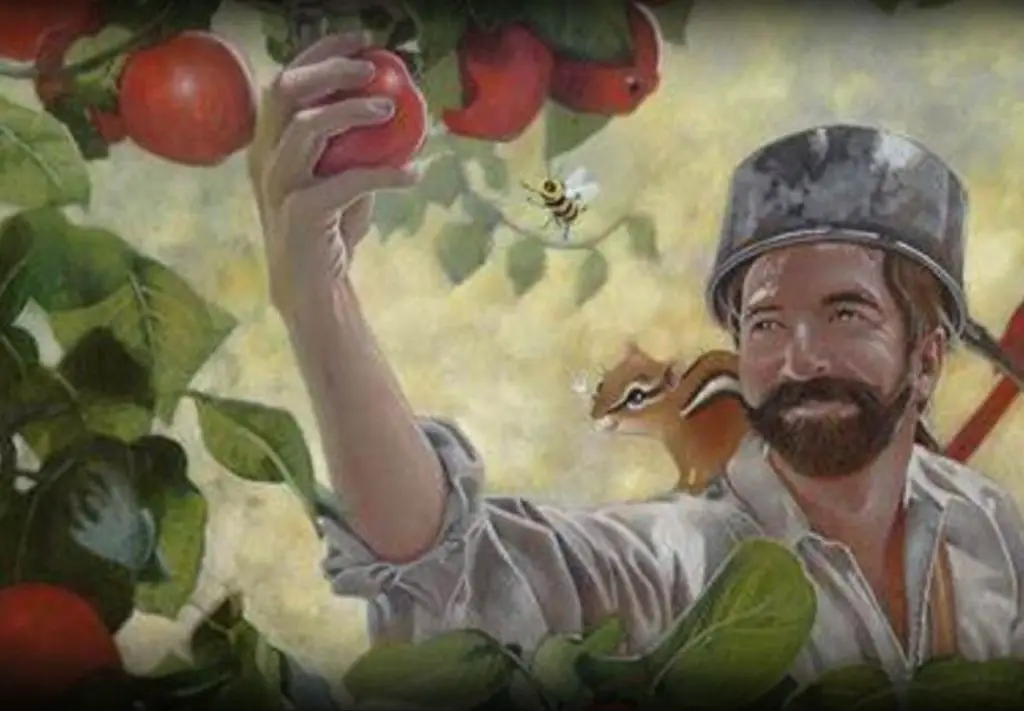Introduction
Johnny Appleseed was a pioneer nurseryman and conservationist who became a folk hero for his tree planting efforts across America’s frontier in the late 18th and early 19th centuries. He established numerous apple tree nurseries that helped settlers grow food and build self-sufficient homesteads. However, in addition to apple trees, Johnny Appleseed was also known to plant the fragrant but curious herb called dog fennel. This has led many to wonder, why did this iconic folk hero deliberately spread this plant?
Dog Fennel’s Uses and Benefits
Dog fennel (Eupatorium capillifolium) is a herbaceous perennial plant native to North America. It produces clusters of small, yellow flower heads and its fern-like foliage has a distinctive odor. Dog fennel has long been used by Native Americans and early American settlers for its medicinal properties.
Dog fennel was commonly used to treat fever, flu symptoms, joint pain, and intestinal worms. The Seminole tribe used a tea made from the leaves and flowers to relieve gas and colic in infants. Cherokee healers utilized dog fennel for respiratory issues. The herbaceous parts and roots were boiled to make medicinal teas, while dried leaves were smoked to relieve congestion.
Beyond its medicinal applications, dog fennel had other benefits for early American settlers. Its strong odor serves as an effective insect repellent, and pioneers would rub the plant directly on the skin or hang bunches in homes to deter pests. The fluffy seed heads were used as tinder to start fires. Dog fennel’s hardy nature also made it useful for stabilizing soil in disturbed areas.

Johnny Appleseed’s Farming Approach
Johnny Appleseed, whose real name was John Chapman, had a very unique approach to farming and agriculture in the late 1700s and early 1800s. While most farmers at the time focused on cultivating staple crops like wheat and corn, Johnny Appleseed preferred planting what were considered “weed trees” like dog fennel.
Rather than settling down in one place, Johnny Appleseed was an itinerant nurseryman who established apple tree nurseries by planting seeds across the American frontier. As he walked across the frontier, he scattered apple seeds and cuttings along his path to create nurseries that could be harvested by future settlers.
Johnny Appleseed chose to plant species like dog fennel not for their ornamental value but for their usefulness to settlers. Dog fennel had many practical benefits – its leaves could be used for seasoning, its roots made a soap, and mosquitos disliked its strong scent. Johnny Appleseed focused on planting pragmatic, useful species instead of decorative plants.
His nurseries required little maintenance or investment, allowing Johnny Appleseed to continue wandering and planting. By creating dispersed nurseries of practical plants like dog fennel, Johnny Appleseed helped sustain and support pioneers settling new lands across America.
Pragmatism and Utility

Johnny Appleseed became legendary for his practicality and down-to-earth values. He valued usefulness and utility in both his personal life and in the plants he spread across the frontier. Appleseed was known to wear tattered clothes and live simply off the land as he traveled and planted nurseries across hundreds of miles.
His preference for hardy, reliable plants to grow and share aligns with this pragmatic spirit. Though dog fennel lacks the fruit-bearing value of apple trees, it had great utility as a common herb for cooking, medicine, and pest control in the 19th century. Appleseed likely recognized the pioneers he aim to assist would benefit from dog fennel’s many versatile uses. Its hardy nature also made it a dependable, prolific plant well-suited for the demands of frontier life.
Generosity and Philanthropy
Johnny Appleseed was known for his extreme generosity and desire to help others. He led a sparse lifestyle with few possessions, dedicating most of his time and effort to planting apple trees and other useful plants across the American frontier. Dog fennel likely supported his philanthropy in a couple key ways.

First, the hardy and fast-growing dog fennel provided a reliable crop that Johnny could distribute to needy settlers. The edible leaves, shoots, and seeds provided nourishment and sustenance for frontier families struggling to survive. Johnny likely gifted baskets of dog fennel to supplement meager pantries.
Additionally, dog fennel had medicinal uses that could have aided Johnny in his philanthropic healing and caretaking. Teas and tinctures made from the plant were used for digestive issues, fever relief, and more. Johnny may have dispensed these natural remedies to pioneers who lacked access to doctors and medicine.
In short, dog fennel was not planted solely for Johnny’s own benefit – the tough, generous plant enabled him to better provide food, medicine, and comfort to the poor settlers he sought to help across the frontier.
Spreading Useful Plants
Johnny Appleseed was focused on spreading useful plants across the American frontier. He understood that settlers moving west needed access to plants that could help sustain and support them. Dog fennel was one of the many plants that aligned with Johnny’s goals.
Dog fennel had a variety of practical uses for early frontier settlers. The roots and leaves could be dried and used for making tea. It also had some medicinal uses as a digestive aid. The fragrant smell of the leaves made it useful for repelling insects. Settlers would often plant dog fennel around their homes or hang bundles of it to keep bugs away.
In Johnny’s view, dog fennel was a hardy and helpful plant that could thrive in the conditions of the frontier. It was low maintenance and grew prolifically. By spreading dog fennel seeds throughout the lands he traveled, Johnny helped make this useful plant abundant and accessible for settlers. Even if it wasn’t an edible food crop, he understood that dog fennel still served important purposes. Johnny focused on the utility and benefits of a plant, not just its culinary uses. For him, spreading useful plants meant enriching frontier settlers’ lives in many practical ways.
Imagery and Folklore
Dog fennel played a prominent role in the lore and imagery surrounding Johnny Appleseed that emerged after his death. He was often depicted wearing a cooking pot as a hat, and sowing dog fennel seeds everywhere he went. This imagery ties into the American folklore motif of an eccentric wanderer or homeless prophet who has a special connection to nature and higher purpose.
The scattering of dog fennel seeds became part of Johnny Appleseed’s mythos as a bringer of useful plants to the frontier. While apple trees were his most famous plant, tales of him sowing dog fennel contributed to his reputation as a mystical figure who transformed the landscapes he traveled through. Dog fennel came to represent his presence having passed by and left something of value behind.
So while dog fennel did have legitimate uses, its prevalence in the Johnny Appleseed legend exceeds its actual agricultural role. But this speaks to how myths can sometimes tell us more about ideals and values than facts. The notion of Johnny sowing dog fennel captures pioneer admiration for making the most of nature’s bounty and sharing it freely.
Ecological Impact

Johnny Appleseed’s practice of freely spreading dog fennel had both positive and negative ecological effects. On the one hand, dog fennel provided vital habitat and food sources for pollinators like bees and butterflies. The plant’s small yellow flowers are an important nectar source, especially in early spring when little else is blooming. This supported stable pollinator populations that are crucial for plant reproduction and a healthy ecosystem.
However, dog fennel is also considered an invasive weed in many areas today. It spreads aggressively and can crowd out native species that provide higher quality habitat and food sources. Unlike Johnny’s time, many natural areas are now highly fragmented by development. Unchecked dog fennel growth can reduce local plant diversity and degrade habitats.
Johnny Appleseed was not an environmentalist in the modern sense, but he did have an appreciation for nature’s bounty and the utility of plants. His distribution of dog fennel was intended to help early pioneers, not harm ecosystems. But he could not foresee the ecological changes that would come. Johnny valued plants for the concrete benefits they provided to people. He did not aim to promote biodiversity for its own sake. From today’s perspective, his actions had both positive and negative impacts on the natural environment.
Lasting Legacy
Johnny Appleseed’s legacy of planting dog fennel across the frontier states lives on today. Though some considered the prolific weed a nuisance, the hardy plant provided sustenance and practical value for homesteaders and animals in sparse, difficult conditions. While Appleseed pursued idealism and faith through his conservation efforts, he tempered these ambitions with pragmatism by spreading useful plants. The images of Appleseed wandering alone, wearing tattered clothing and a tin pot hat, scattering seeds have become intertwined with emerging American identity and mythology. His dedication to exploration and cultivating the wilderness captures the individualism, resourcefulness, and romanticism of 19th century American folklore. Though dog fennel eventually became invasive, Appleseed’s dispersal came from a place of practical aid and compassion, not ecological recklessness. His vision was to make the territory more hospitable and let small kindnesses take root, embodying American optimism and belief in forging one’s destiny. Though the effects were controversial, Appleseed followed his principles and helped enable westward expansion and development. His memory persists through place names, literature, film, and festivals that celebrate his symbolic embodiment of generosity and resourcefulness on the frontier. While ecological mistakes were made, Appleseed’s actions intended to spread opportunity and offer humble relief, reflecting the blend of idealism and pragmatism that still characterizes America.
Conclusion
In conclusion, there were several factors that motivated Johnny Appleseed to plant dog fennel as he traveled and spread useful plants across the American frontier. He chose plants like dog fennel for their practical uses, as the fronds were used for making tea and seasoning food while the roots could be dried and used for medicine. His generous spirit and desire to be helpful led him to freely share useful plants with settlers in need. He believed in living simply, planting pragmatically, and using what nature provided – which aligned with spreading hardy plants like dog fennel that required little care. He became a folk hero known for random acts of kindness, so planting dog fennel added to his mystical persona as people imagined him wandering and sowing useful plants across the land. While dog fennel is now considered an invasive weed, in Johnny Appleseed’s time it was a practical, hardy plant that served a purpose for settlers. His plantings of dog fennel exemplify his practical yet generous approach and the lasting legend he became.
In summary, Johnny Appleseed planted dog fennel and other useful plants to pragmatically help settlers through acts of charity and out of the usefulness the plants provided, adding to his image as an iconic folk hero.